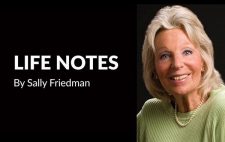“So what were the 1960s like?” my granddaughter Emily asked. The question was not random: Emily was studying the 1960s as – ahem – history.
She arrived not with a notebook, of course, but with her laptop. No self-respecting ninth grader would be without one. Delighted that I might even be a vital academic source for her, I started to tell Emily about what she called, at one point, “the olden days.” I tried not to flinch.
I think what Emily wanted to hear was that her grandmother had been a wild radical activist who marched, shouted, carried banners and maybe even got arrested. I had to disappoint her.
My own association with that decade wasn’t about the glamour of it all, the wildness of it all or Studio 54. Not when I was busy bringing babies into the world and trying to catch up on sleep that seemed lost forever.
Not when their father, a newly minted lawyer, was working day and night to keep moving forward and I was a stay-at-home mom, as were so many of us who had worked diligently to earn our college and even graduate degrees. Home, back then, was where the heart was – and the mommy too. So no, I was definitely not stoned at a commune or burning my bra or marching for causes I passionately believed, because I could never get a babysitter willing to stay for hours with three kids under the age of 5.
Emily seemed crestfallen.
Had I missed out on the rock festivals and the incense, let alone the pot? I had indeed.
I’d even missed The Beatles parties that some of my trendier friends attended. The aromas that surrounded me were more likely baby powder and baby shampoo than anything stronger, and my “concerts” consisted of rousing renditions of “Three Blind Mice,” and later, “Puff, the Magic Dragon.”
But Emily found it intriguing that I could recount, with almost perfect recall, the pain of the assassinations that will forever mark that era for some of us. Just when the world was supposed to be straightening itself out – just when our gallant young president asked that famous question about what we could do for our country – it all came crashing down around us in a shower of bullets.
Like most Americans old enough to have memory, the horror of JFK’s death is a permanent scar on my psyche. One that nobody will ever forget, not even with the horrors of September 11, 2001 superimposed on it.
Those assassinations seemed to come in a steady, pummeling stream: Malcolm X and Bobby Kennedy, Martin Luther King Jr., Chaney, Goodman and Schwerner, civil rights workers so young and idealistic that their deaths seemed an assault on all of us. It was as if some cruel joke had been unleashed on a generation geared to expect Camelot and astonished that it could have gone so wrong.
For me, some of the most searing images of the decade are associated with violence and mayhem, nightsticks and riots, and always, always, that rider-less horse and the wrenching salute of a little boy in a proper overcoat at his father’s funeral. And now even that “little boy” is gone.
I know there were other things going on. The Rat Pack was out there making mischief. The Mamas and the Papas had nothing to do with Goldilocks. And too many were dropping out and dropping acid. I also have a sweeping remembrance of sadness: Kent State, cities in riot and the baffling specter of Vietnam.
I hated to spoil it for Emily, to burst her bubble about how it was for her grandmother. But frankly, I don’t miss that particular piece of the past when everything was changing, spinning out of control. It was, for me, an era that began with such grace and hope and staggered to a close, heavy with disillusionment.
It’s not what my granddaughter want to hear. But it’s my truth. And that’s the least – and the best – I can give a granddaughter.











